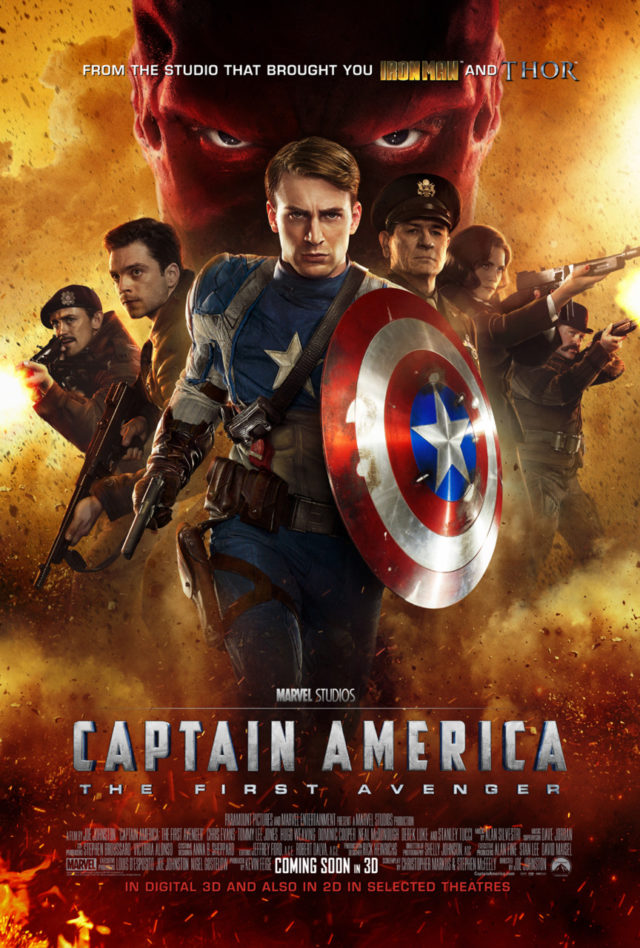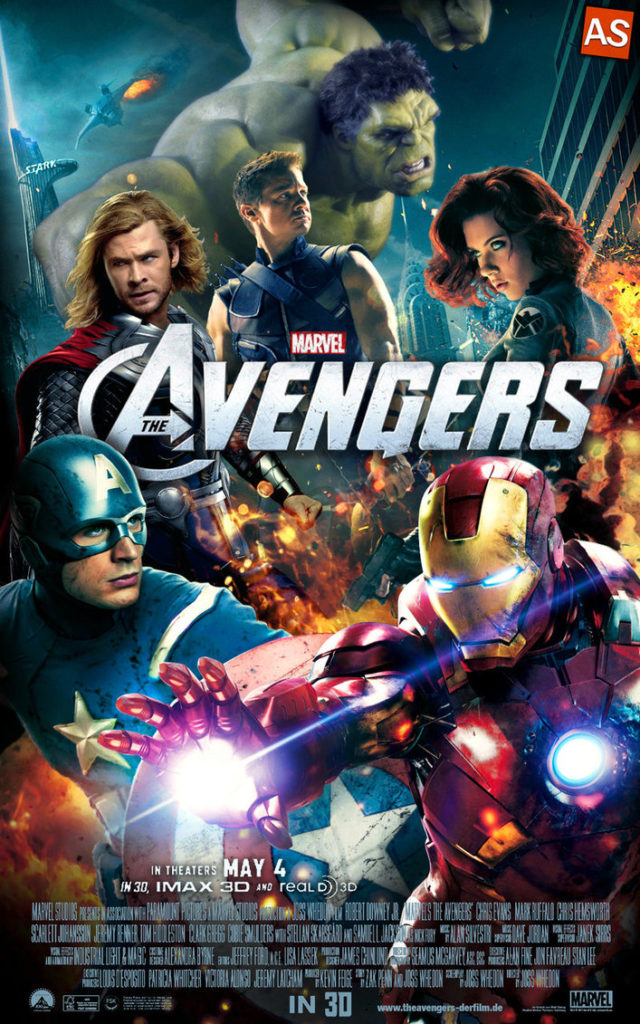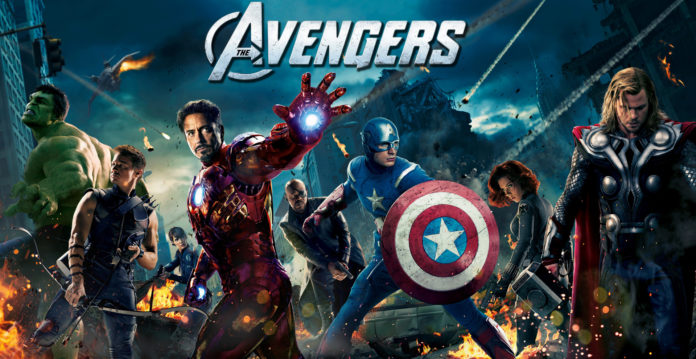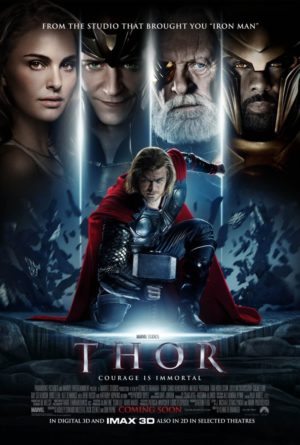By Molly Atchison | Print Managing Editor
Following the recent release of Marvel’s “Black Panther” and in anticipation of the upcoming “Avengers: Infinity War” release, it is the perfect time to revisit the Marvel Cinematic Universe (MCU). Over the next six weeks, leading up to the May release of the long-awaited “Infinity War,” I will be breaking down a group of movies in the MCU based off Digg.com’s Best Way to Watch the Marvel Cinematic Universe list, so sit down, grab your popcorn and your reading glasses, and prepare to have your Marvel-loving minds blown.
These three movies, which close out phase one of the MCU, are the first Marvel fans see harnessing the flashy, eye-catching CGI style they know and love. Thor and Captain America introduce the last of the original team in this arc, and the Avengers brings all of the heroes together to fight as a team for the first time:
Thor (2011):
As the first intergalactic expansion in the MCU, Thor took a different spin on the traditional hero by applying the concept of outer dimensions, nicely setting up the rest of the series with its ties to mythical origins and out-of-this-world adventure.
Series Relevance: Introducing the brash, dashing and incredibly strong-willed Thor Odinson (played by Chris Hemsworth), this movie embodies, not only an interesting departure from the Earthen realm, but also an expansion of the MCU into other dimensions, both literally and figuratively. Thor, a mythic and extraterrestrial god, is banished to earth from Asgard, the viking land of the gods, for his temper and lack of discipline. During his time among the humans, he learns to control his temper and his power, and finds himself turning into a leader of sorts.
Perhaps more important than expanding a character, Thor’s world brought a new element to the MCU. In addition to introducing new villains and new technology, it made it possible to expand the series to include characters such as Dr. Strange and the Guardians of the Galaxy crew. Characters from the comics would now be able to come to life on the big screen.
Entertainment Value: Thor is debatably one of the least-liked characters in the MCU. For some, his stories are too dark and devoid of humor. For others, he is not developed enough as a character, and his presence in the Marvel universe seems to be merely supportive. Personally, Thor is one of my favorite members of the Avengers, because he is the perfect mix of innocence and ferocity. Until you’ve seen him over-dramatically smashing a cup of coffee on the floor or screaming at doctors for poking him with a needle, you don’t truly understand the humorous side of Thor. While this isn’t the best of the Marvel movies, because of its slow pace and the wishy-washy villain story, it still holds more merit than others have.
Cultural/Political Value: Of all the movies in the MCU series, Thor is probably the least influenced by cultural and political contexts at the time of production; however, this doesn’t mean that it’s devoid of greater meaning. The plotline revolves around Thor and his brother, Loki, vying for the validation of their father, Odin. In a shocking turn of events, Loki learns more about his past and begins to question his relation to the Asgardian royal family. There is an underlying theme of familial ties, relations between father and son and brotherly war. More than anything, Thor is about establishing the entrance into other worlds, and it does a wonderful job at blurring lines between the earth we know and the rest of the series’ worlds, including the fantastical journey that will begin in the Avengers movie.

Captain America: The First Avenger (2011):
Introducing America’s sweetheart – who is literally named after the United States – Captain America takes audiences back to 1941. Steve Rogers, the small-but-not-meek American played by the dashing Chris Evans, wants to serve his country at the beginning of the second world war. Rogers volunteers himself for a suspicious experiment that leaves him with enhanced physical capabilities and a dangerous enemy in the German ranks.
Series Relevance: As the MCU series approaches the first Avengers movie, rounding out the arsenal of heroes is incredibly important. Captain America does just that. The moral compass of the unit, Cap is strong-willed and steadfast and focused on doing the right thing no matter the cost. The reason this movie is so important to the series is that it completes the original Avengers team and brings the cosmic cube into play. The cosmic cube is a powerful object, and although its powers are not fully developed, it is known to harness the ability to access other dimensions; therefore, the cube is invaluable to both the Avengers initiative and its enemies.
The movie also brings characters together. Although it takes place over 70 years ago, Captain America maintains a connection with Tony Stark by means of his acquaintance with Stark’s father, who assists Captain America on his mission during the movie. Throughout this movie, we see the growth and capability of a team leader for the Avengers – the perfect set-up to the first Avengers movie.
Entertainment Value: One of the most entertaining movies in phase one of the MCU, “Captain America: the First Avenger” applies a good mix of wholesome humor, romance and impressive CGI effects. From Steve Roger’s initial transformation, to the final battle between him and Red Skull, this movie presents the newest wave of CGI, which is part of the reason the series did so well. Without the growth of graphic imagery, both Thor and Captain America would never have made it off the ground. The clear, crisp imagery and the smooth renditions of fight scenes allow the movie to be well-understood, despite the dark lighting of the filming. A personal favorite, this movie tops the phase one charts both for bringing an enticing, likable character to the table, and for successfully setting the stage for a movie to come.
Cultural/Political Value: 2011 was just one year before the 2012 presidential election, and although it made no clear political statement in the realm of American politics, Captain America was definitely a political centerpiece in the film industry. Building its story around WWII and the Nazi special experiments program, the movie is a commentary on the struggle between various entities — people and government, government and government, and soldier against the world. He represents apple pie and the American dream, but Captain America is also passionately against injustice, standing up for equality despite circumstance, ability and disposition. In a time when America was looking to find its roots again, Captain America brought us back to the values and the steadfastness the country needed.

The Avengers (2012):
It all starts here. The first Avengers movie officially launched the MCU into its full, three-phase arc, and with it came new adventure, new villains and several post-movie credit clips hinting at the series to come.
Series Relevance: The first Avengers movie signifies the longevity of the series, revealing for the first time the lasting effect of the Avengers initiative on the human world. Viewers begin to witness the team melding together; while bringing superheroes together is never easy, throughout the movie, Captain America becomes the rudder of the ship, Iron Man becomes the dynamite that drives them forward, the Hulk becomes the support that protects and serves them all, Thor brings wisdom and a bit of comedic relief, and finally, Black Widow becomes the glue that holds the team together. As soon as they work through some of their quirks, The Avengers are unstoppable. They defeat invaders attempting to take over the Earth and begin to prepare their world to fight extraterrestrials. With their advanced tech and their heroic displays of power, the Avengers soon become nationally recognized heroes, and the series continues to play on that for the rest of the Arc.
Entertainment Value: “The Avengers” packs a punch with witty humor, fast action and emotional scenes. Although there are are fair share of plot holes, it is all wrapped up in a pretty package of CGI and aesthetically appealing costumes. “The Avengers” embodies everything a comic book fan looks for in a film rendition of their favorite series. As the series progresses, it will become more and more difficult to find flaws in the movies, but this one tops the chart of the cinematic genre as a whole.
Cultural/Political Value: Having come to fruition during an election year, the cultural and political value of this movie revolves around some of the major issues being debated — national security, immigration and corruption. However, it does not take a stance on any of the issues, and it does not actually hold much cultural or political value, other than its relevance to the state of political affairs at the time. If that’s what the audience was looking for, it was sorely disappointed.
With the conclusion of Phase one, the MCU will now travel into the intergalactic realms, and next week we will follow them into the fold, meeting new heroes, villains and issues, and ending with a serious rift in the Avengers team.







